FAIR = Fairness & Accuracy in Reporting
Janine Jackson interviewed Public Citizen’s Bartlett Naylor about Trump’s crypto grift for the May 9, 2025, episode of CounterSpin. This is a lightly edited transcript.

Common Dreams (5/6/25)
Janine Jackson: I read, thanks to Jake Johnson at Common Dreams, that Trump is planning a fancy private dinner for top investors in the $Trump meme coin. It has a dollar sign in front of it, but I don’t know how to pronounce that. But it’s the crypto token that is enriching him hand over fist, and with other crypto-related investments, has reportedly gifted the Trump family $2.9 billion in just the last six months.
I would be ashamed, but I believe that a lot of listeners are with me as I ask, “Huh? It’s a what? That’s doing what?” Here to help us make sense of what’s happening, and why it matters, is Bartlett Naylor. He’s financial policy advocate at Congress Watch, part of the indispensable group Public Citizen. Welcome back to CounterSpin, Bart Naylor.
Bartlett Naylor: Many thanks for having me.
JJ: What’s a meme coin? And why would anybody pay money for it?
BN: I don’t know and I don’t know!
So a meme coin is generally a term of derision within the cryptocurrency community for a coin that is simply developed as a joke to make fun of something, to take advantage of an internet theme. Folks have heard of Bitcoin, and a meme coin, like Bitcoin, is simply a digital receipt that you paid money for something. It’s not shares in a company that is an enterprise that, ideally, would make a profit and pay you a dividend. It’s just a digital receipt. With Bitcoin, you could sell that to somebody else, and if they paid you more than you paid for it, you’d make money.

$Trump marketing website
And that’s the idea with Trump’s meme coin, which surprisingly, for such a selfless guy, he named $Trump. So when you buy one, you are basically sending him money, and you’re also having a trading fee, which is where he’s actually made most of his money, which also goes to Donald Trump.
You get nothing, according to him. He even says on the website, “This is not an investment opportunity. You should do this to celebrate me, to celebrate my leadership, my willingness to fight, fight, fight.”
And he announced a few weeks ago that those 220 that buy the most will be invited to a dinner with him. It’s been a little unclear, sometimes he says the White House; other times he says it’s a golf club near Washington, DC.

Middle East Eye (5/1/25)
For background: you can’t do this. The law forbids the president from soliciting gifts. The law also forbids the president from accepting gifts from a foreign state, and this $2 billion that you had mentioned is coming from the United Arab Emirates, a sovereign fund in Dubai, and they’re going to use a separate cryptocurrency called the stablecoin. And, again, that’s a coin that is tied to a fiat currency such as the dollar. One Trump stablecoin equals $1, which basically, when you sent him that, you’re giving him an interest-free loan.
JJ: Soliciting gifts—you’ve just said it, but soliciting gifts is a crime, right? And you wrote to the DoJ, you and others wrote to the DOJ and the Office of Government Ethics, to say just that.
BN: Exactly. And so we are waiting on the edge of our seat that Pam Bondi will file a federal indictment of the president. I speak in jest, of course, and Trump controls the federal prosecutors. So for another three years and ten-ish months, nine months, we will await actual accountability for this.
JJ: I mean, just to be clear, there are laws. I know that our minds are all blown, but there are laws, there are precedents, there are things to rely on. And, you know, I wasn’t a fan of the status quo. I don’t want to return to bipartisan gentility, but there are things where you think, “Wow, I didn’t even know that we needed a law to prevent that, because no one’s ever tried to do that.” Where are we, in terms of response and resistance?

Bartlett Naylor: “A number of senators have called this the biggest corruption in presidential history.”
BN: A number of senators have called this the biggest corruption in presidential history, called for federal prosecution. Senator Ossoff of Georgia, Chris Murphy of Connecticut, Senator Blumenthal, also of Connecticut, have called for an investigation by the Permanent Subcommittee on Investigations. There are calls for this. But of course, we have a captured Congress, a captured Republican Party, and now a captured Justice Department that will not act.
JJ: Well, what would you ask from journalism at this point? It’s strange times that we’re in, and we want to acknowledge that some of the groundwork has been laid in previous administrations. But at the same time, something new is happening. And I just wonder, finally, what you would ask from reporters on this.
BN: Ongoing attention to this crypto grift. Because the two main stories of political influence in the 2024 election were the $280 million by Elmo Musk, to basically buy himself a co-presidency for a while. But the second was a hundred and some million dollars spent by the crypto industry, mostly to defeat anti-crypto lawmakers, the most prominent being Sen. Sherrod Brown of Ohio. And that has sent a chill through all of Congress, and especially Democrats, who otherwise would responsibly be jaundiced about cryptocurrency, but they are voting in favor of it.
There’s going to be a vote today. We actually don’t know the outcome, but it may well enable and give federal imprimatur to the cryptocurrency stablecoin, the kind that Trump just unveiled, this billion-dollar deal with Dubai. And they’re doing that because they’re afraid of political spending from the crypto industry.
The advertisements paid for by the crypto industry don’t say, “Vote for Bernie Moreno because he’s pro-crypto, and vote against Sherrod Brown because he’s anti-crypto.” No, the political spending doesn’t mention crypto at all. It mentions something else, some problem that they made up about Sherrod Brown, or Katie Porter in California, or something else.
Other PAC’s have done the same thing. If their own issue isn’t particularly popular, they pick something else. But voters need to know that crypto is the biggest bad corruption issue with Trump, and they should hold their lawmakers to account if they enable it.
JJ: I’d like to end right there, but I just need to ask you—somebody is like, “What the hell is crypto? What is it that I’m concerned about?” Do you have your quick explanation for people who don’t even know where to start with this issue?

CNN (7/27/24)
BN: I would call it thin air, a Ponzi scheme. Cryptocurrency was devised by an anonymous person in 2008, as somehow a way to have a payment system that doesn’t rely on banks. And if we all just use his currency, Bitcoin, then we wouldn’t have to rely on the mega banks that crashed the economy in 2008, like JP Morgan. There would be a limited amount of them, and we would just use that.
In fact, it has not caught on, for a number of reasons, as a currency. It takes a ridiculous amount of energy to validate the transaction between, let’s say, you and me, and it’s unwieldy. But, again, I will call cryptocurrency thin air.
And I’m actually quoting President Trump of 2018. He also understood that cryptocurrency was a big nothing. He has since realized that he can personally make a lot of money, so he’s grifting away.
JJ: Yep. Times have changed. Well, thank you very much for that.
We’ve been speaking with Bart Naylor of Congress Watch at Public Citizen. They’re online at Citizen.org. Thank you so much, Bart Naylor, for joining us this week on CounterSpin.
BN: Thank you for having me.
Since the earliest days of the post–October 7 US/Israeli genocide in Gaza, corporate media outlets have claimed that Hamas uses Palestinian civilians as human shields. Protocol 1 of the Geneva Convention characterizes the practice thusly:
The presence or movements of the civilian population or individual civilians shall not be used to render certain points or areas immune from military operations, in particular in attempts to shield military objectives from attacks or to shield, favour or impede military operations.
In other words, when civilians are used to shield military targets, attacking those targets can be legal under international law, but the attacker, as Al Jazeera (11/13/23) noted, still has to adhere to
the principles of distinction and proportionality: An army has the duty to target only the enemy, even if this means facing greater risks to minimize civilian casualties; and to weigh the military value of each attack against the civilian casualties that are likely to result from it.

Jewish Currents (7/17/24): “By casting all the protected sites and people it has bombed as “shields,” Israel thus seeks to shift the responsibility for its mass killings of civilians and sweeping destruction of civilian infrastructure onto Hamas—absolving itself of blame and legal accountability.”
Israel and its backers, however, have completely distorted this concept, in an apparent attempt to give their massacres in Gaza a veneer of legality. The scholars Nicola Perugini and Neve Gordon (Jewish Currents, 7/17/24) explained how human shielding discourse has been misapplied to Gaza:
Parties alleging the use of human shields have typically restricted the charge to limited territorial areas; in contrast, Israel has cited Hamas’s underground tunnel system to cast every square inch of Gaza as a human shield. This apparently endless multiplication of the human shielding accusation has functioned to erase the possibility of Palestinian civilianness altogether.
This corruption of the meaning of “human shields” has distorted much of the corporate media coverage of the Gaza genocide. At the outset of the October 2023 escalation in Palestine, a Boston Globe article (10/8/23) asserted that Hamas “uses its own civilians as human shields against attacks. Israel warns civilians before it launches attacks and urges that they leave conflict zones.” This was a stunning assertion, given Israel’s prolific record of deliberately killing Palestinian noncombatants, which long predates October 7, 2023 (FAIR.org, 10/13/23).
The New York Times’ editorial board (10/16/23) flatly stated that “Hamas is using the people of Gaza as human shields against Israel’s bombing campaign,” without pointing to any source documenting a single instance of this practice.
The same was true of a piece that appeared a day later in the Wall Street Journal (10/17/23), which said that “Hamas uses the inhabitants of Gaza as human shields.” It described the group as employing a “human-shield strategy.”
Such claims have two major problems. One is the lack of evidence for them, and the other is the extensive evidence of Israel using Palestinian civilians as human shields.
Consider, for example, the UN Human Rights Council (UNHRC) report on Operation Cast Lead, Israel’s US-backed 2008–09 assault on Gaza. The UN’s fact-finding mission
found no evidence to suggest that Palestinian armed groups either directed civilians to areas where attacks were being launched or forced civilians to remain within the vicinity of the attacks.
The mission did, however, find credible allegations that “Israeli troops used Palestinian men as human shields whilst conducting house searches.”
The UNHRC’s report on Israel’s 2014 offensive in Gaza, Operation Protective Edge, fell short of saying that Hamas used Palestinians as human shields. The commission said it was “disturbed by” a “report” that a Hamas spokesperson said people in Gaza should go on their roofs as a way of “shielding their homes from attack.”
The document said that “although the call is directed to residents of Gaza, it can be seen and understood as an encouragement to Palestinian armed groups to use human shields.” That’s quite different from saying that Palestinian fighters actually did compel Palestinian civilians to act as human shields.
But the report said that that’s what Israel did:
The manner in which the Israeli soldiers forced Palestinian civilians to stand in windows, enter houses/underground areas and/or perform dangerous tasks of a military nature, constitutes a violation of the prohibition against the use of human shields.
An Amnesty International report (3/26/15) on Operation Protective Edge noted that
Israeli authorities have claimed that in a few incidents, the Hamas authorities or Palestinian fighters directed or physically coerced individual civilians in specific locations to shield combatants or military objectives. Amnesty International has not been able to corroborate the facts in any of these cases.
Another important context for the human shields issue comes from the Israeli human rights group B’Tselem (11/11/17). The organization says that, since Israel occupied the West Bank and Gaza in 1967,
Israeli security forces Israeli security forces have repeatedly used Palestinians in the West Bank and in the Gaza Strip as human shields, ordering them to perform military tasks that risked their lives. As part of this policy, soldiers have ordered Palestinian civilians to remove suspicious objects from roads, to tell people to come out of their homes so the military can arrest them, to stand in front of soldiers while the latter shoot from behind them, and more. The Palestinian civilians were chosen at random for these tasks, and could not refuse the demand placed on them by armed soldiers.
This use of civilians is not an independent initiative by soldiers in the field, but the result of a decision made by senior military authorities.

By describing a raid on a hospital as an effort to “root out Hamas,” the Wall Street Journal (11/10/23) gave credence to unsubstantiated Israeli claims.
Over the course of the genocide in Gaza, corporate media have frequently ignored this body of evidence. The human shields propaganda arguably reached its apotheosis in the run-up to Israel’s November 2023 attack on Al-Shifa hospital, Gaza’s largest medical complex at the time, and during and after the assault.
A Wall Street Journal article (11/10/23) on the matter carried the headline “Israeli Forces Race to Root Out Hamas,” with the subhead “Israeli forces face one of their toughest challenges as they converge on strip’s largest hospital.” Taken together, these phrases imply that Al-Shifa has a Hamas presence that ought to be “rooted out.” The piece said that Israeli
troops have converged in the past day on the sprawling facility, which Israel contends holds a major Hamas command bunker underneath the complex, a claim Hamas has denied.
At no point did the authors mention that Israel had presented no credible evidence in support of these allegations (FAIR.org, 12/1/23).
A New York Times report (11/15/23) said that
Israel maintains that Hamas built a military command center at the hospital, using its patients and staff as human shields.
The seizure of Al-Shifa, along with whatever evidence the Israelis produce of Hamas’s military presence there, could affect international sentiment about the invasion, as well as the continuing negotiations to free the hostages captured by Hamas last month.
This passage suggests that the question is what type of evidence Israel will provide of Hamas’s supposed operations at Al-Shifa, rather than whether it has any convincing evidence at all. The piece opted to present the supposed command center as a “he said, she said” narrative, but Hamas reportedly said that they were “prepared for an international delegation to conduct a search of the hospitals and their grounds for evidence of such alleged underground tunnels and command centers” (Mondoweiss, 11/13/23).

Human Rights Watch (11/14/23) found that “no evidence put forward would justify depriving hospitals and ambulances of their protected status under international humanitarian law.”
Meanwhile, medical staff at the hospital denied that there was a Hamas command center under the facility (Guardian, 11/14/23). Human Rights Watch (11/14/23), for its part, said:
The Israeli military on October 27 claimed that “Hamas uses hospitals as terror infrastructures,” publishing footage alleging that Hamas was operating from Gaza’s largest hospital, Al-Shifa. Israel also alleged that Hamas was using the Indonesian Hospital to hide an underground command and control center and that they had deployed a rocket launchpad 75 meters from the hospital.
These claims are contested. Human Rights Watch has not been able to corroborate them, nor seen any information that would justify attacks on Gaza hospitals.
Nevertheless, a subsequent CNN (11/17/23) report took the “shrug and say, ‘gee, golly, we just don’t know’” approach:
Israel points to the hospital as an example of Hamas’ use of civilians as human shields.
Since launching an operation at Al-Shifa this week, the Israel Defense Forces (IDF) claimed it found a tunnel shaft and military equipment, but it has not yet shown proof of a large-scale command and control center. Hamas denies the allegations. CNN has not verified the claims of either Israel or Hamas.
CNN may not have been unable to verify either party’s claims, but they do their audience no favors by leaving out Human Right Watch’s remarks, or the following from Katrina Penney (Otago Daily Times, 11/16/23), a representative of MSF, which had personnel working at Al-Shifa:
We have seen no evidence that the hospital buildings or the compounds are being used by Hamas as a military base. In fact to the contrary; the hospital facilities have been trying to treat patients and trying to shelter civilians and their families at levels far beyond their capacity.
Excluding such testimonials gave Israel’s “command center” and “human shields” arguments unwarranted credibility. In contrast to CNN, Maureen Clare Murphy (Electronic Intifada, 11/15/23) offered a much sharper assessment of the available evidence, writing that
Israel’s own propaganda published in the aftermath of the raid shows that Netanyahu and the military’s longstanding accusation that Hamas uses Al-Shifa to shield its command center is a deadly lie.
But such honesty and precision is generally too much to ask of corporate media.

To establish the “truth” that Hamas uses human shields, Washington Post columnist James Willick (11/14/23) quotes a Post editorial (11/5/23) criticizing Hamas for “provoking Israel militarily—while protecting its own leaders and fighters in tunnels.” By this logic, any non-suicidal military operation against Israel would involve “human shields.”
This dismal coverage of the human shields question was not limited to the reporting on Al-Shifa. Throughout the genocide, corporate media have often treated the idea that Hamas routinely uses Palestinian civilians as human shields as an established fact, while pretending that Israel doesn’t do exactly that.
Nor have media offered any proof of Hamas engaging in this practice in the post–October 7 US/Israeli rampage, as in an in-house Washington Post column (11/14/23) by Jason Willick, headlined “We Can’t Ignore the Truth That Hamas Uses Human Shields.” Hamas, he said, was “trying to increase” the number of dead Palestinian civilians.
A Newsweek op-ed (5/23/24) from Fordham University philosophy professor John Davenport referred to what he called “the stark fact” that Hamas uses “ordinary Palestinians as ‘human shields.’” While voluminous evidence of US/Israeli crimes throughout the genocide was readily available (Middle East Eye, 10/20/23, 5/16/24), Willick and Davenport failed to marshal a single report from the UN or an NGO that substantiated their claim that Hamas uses Palestinians as human shields.
Meanwhile, the Euro-Med Human Rights Monitor (7/1/24) said that, in the months since October 7, “the Israeli army’s use of Palestinian civilians as human shields has been documented on a large scale.” Haaretz (8/13/24) reported that “random Palestinians have been used by Israeli army units in the Gaza Strip for one purpose: to serve as human shields for soldiers during operations.”
Still, US media commentators like Bret Stephens (New York Times, 9/3/24) and the Journal’s editorial board (10/7/24) were more interested in making uncorroborated claims that Hamas uses Palestinians as human shields than in discussing Israel’s widespread, confirmed use of the practice.
More recently, Haaretz (3/30/25) ran an article by an anonymous senior officer in the Israeli military detailing how “in Gaza, human shields are used by Israeli soldiers at least six times a day.” The officer explains how no infantry force in the Israeli military goes into a house in Gaza before a human shield clears it, which means “there are four [human shields] in a company, 12 in a battalion and at least 36 in a brigade. We operate a sub-army of slaves.”

Reuters (4/6/25) allowed a National Security Council spokesperson to claim without contradiction that aid workers killed by Israel were “human shields for terrorism.”
Even after Haaretz published this account, the New York Times ran an op-ed (4/6/25) asserting that Hamas uses Palestinian civilians as “human shields,” as if it were Hamas that kept a slave army of Palestinians for this purpose.
Similarly, a Reuters report (4/6/25) on Israel’s March 23 massacre of 15 paramedics quoted US National Security Council spokesperson Brian Hughes, “Hamas uses ambulances and more broadly human shields for terrorism.” The piece didn’t bother pointing to the lack of proof for Hughes’ claim, nor did it inform readers that Israel uses Palestinians as human shields on a daily basis.
In the same vein, an NBC News piece (4/7/25) on the paramedics atrocity included the sentence, “The White House on Sunday said Trump held Hamas responsible for the incident because Hamas uses ambulances and ‘human shields.’” Nothing in the article cast doubt on this unsubstantiated assertion, or noted that a senior Israeli military officer had just acknowledged (Haaretz, 3/30/25) that
the highest-ranking personnel on the ground have known about the [Israeli military’s] use of [Palestinians as] human shields for more than a year, and no one has tried to stop it.
To suggest that a meaningful portion of the Palestinians killed in Gaza can be attributed to Hamas using them as human shields—lack of evidence be damned—is to blame Palestinians for their own deaths, while reducing US/Israeli responsibility for the slaughter.
The canard also demonizes Hamas, painting its leaders as brutal savages with no regard for any human life. That in turn rationalizes the US/Israeli assault on Gaza; the narrative suggests that Hamas are so brutal toward their own people that one should cheer for Israel to eradicate them, not only for Israel’s benefit, but ultimately for the Palestinians’—even at the cost of leveling Gaza and exterminating its people.
Janine Jackson interviewed the African American Policy Forum’s Tanya Clay House about erasing history for the May 2, 2025, episode of CounterSpin. This is a lightly edited transcript.
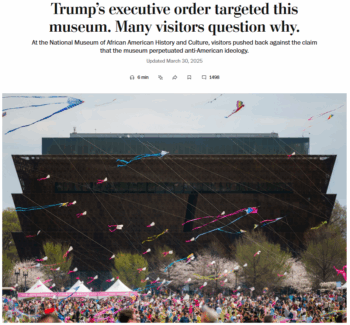
Washington Post (3/30/25)
Janine Jackson: Historians, teachers, community leaders and racial justice advocates are rallying around the National Museum of African American History and Culture, as the Trump White House has set its destructive sights on it as part of the effort to erase Black history from US history, to claim that any accurate acknowledgement of Black people’s lives in this country “deepens societal, divides and fosters a sense of national shame, disregarding the progress America has made.”
We’ve heard this song before. There are few more radical ways to oppress people than to suppress their history, their experiences, their voices, to insist that only ever more wonderful things have happened in the United States, and that only that fairytale is acceptable to tell or to hear. The harm wrought—and, to be clear, intended—is not just to Black people, but to the very concept, the aspiration of multiracial democracy.
Which is why the Freedom to Learn network, and its #HandsOffOurHistory campaign, comprise so many groups and communities. The coalition was convened by the African American Policy Forum, where our guest is senior strategist, and where I serve as a board member.
Tanya Clay House has worked for years on supporting democracy by supporting communities of color’s right to vote, including work with the American Bar Association, the Hip Hop Caucus and the Kairos Democracy Project, as well as as an independent consultant. She joins us now by phone. Welcome to CounterSpin, Tanya Clay House.
Tanya Clay House: Thank you so much for having me. I appreciate it.
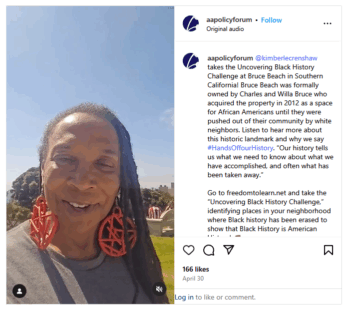
Instagram (4/30/25)
JJ: I just saw Professor Kimberlé Crenshaw, from the African American Policy Forum, doing a kind of video minute about Bruce’s Beach, a California property where Black families were living in the ’20s—too happily for the likes of their white neighbors, who had the city seize the land under eminent domain, saying it’d be used for a public park, and then leaving it undeveloped once they’d achieved the obvious goal of driving the Black people out.
That’s just some of the flavor of this kaleidoscopic project. Tell us more about what #HandsOffOurHistory and Freedom to Learn are doing, and hoping to do.
TCH: Thank you so much for this opportunity to speak about this. So we’re at a time—and I hesitate to say this is a critical time; it’s been critical for a long time—there are things that are occurring within our country that many maybe never thought would come back, because we thought we had at least evolved on a certain level to not engage in revisionist history, to not go backward towards the times when we are qualifying people based upon their skin color, that we are continuing to demean and to engage in actions that really undermine the value of people, culture, in order to stoke fear, in order to maintain power of, essentially, the white majority.
Unfortunately, we are at that time point, at that place again, where we are essentially this generation’s civil rights movement. We have a coalition of organizations that convened about three years ago under the Freedom to Learn banner, in order to really speak out against the beginning stages of attempting to eradicate our history.
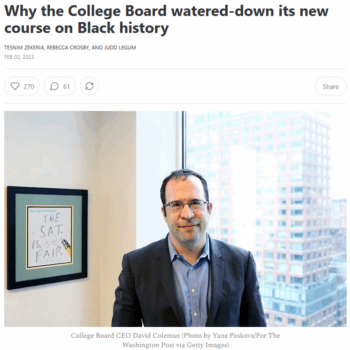
Popular Information (2/2/23)
The push to eliminate African-American studies and pull out certain teachings, particularly Dr. Kimberlé Crenshaw’s teachings, within African-American studies courses, this had moved through Florida and all the way up through College Board standards, and there was a galvanizing of organizations in order to push back on what we saw occurring, because it was undermining the ability of students to learn their history.
So we came together three years ago, and then again last year under the same banner, because book bans had evolved, book bans across the country in every state, and we were really trying to raise the specter and bring it to people’s attention, what this is doing, coming after the culture, and coming after freedom of thought.
And this was actually the playbook of Project 2025, and now, unfortunately, another year later, we are living Project 2025. We are living that playbook, of not only the book ban, not only the erasure, the undermining of African-American studies courses, but the direct targeted attacks on all things diversity, equity and inclusion, which is really another way of targeting Blackness, and targeting those that are other, trying to other people, and saying that, in fact, this country is not inclusive; in fact, it is only that for the white majority.
And so Freedom to Learn is really focused. We recognize that it can no longer just be a day—we were galvanizing on one day every year—but also to continue that drumbeat. But this year, we had a whole week, Freedom to Learn Week of Action. And it’s because of, you mentioned the executive order that is specifically targeting Black history, and the Black museum mentioned and called out is the National Museum for African-American and Culture, otherwise called the Black Smithsonian, here in DC, but also Black museums across the country.
And so we are galvanizing and bringing people together to lift up all of the things that I’ve discussed, and to really focus on what this is doing to our country, and how it is completely undermining the freedom of thought, how it is essentially engaging in replacement theory, and how we are in need of a movement to ensure that we do not repeat the sins of our past.
JJ: I get frustrated when news media say “the White House is seeking to undermine Black studies, Black museums and cultural institutions.” And, first of all, that that’s somehow in the interest of “ending divisions.” I don’t know how you even type the words that Donald Trump wants to end divisions.
But then, the idea that somehow it’s only Black people who are harmed, or only Black people who care, when we’re talking about history and, as you say, freedom of thought in its essence. This is of interest, or should be of concern, to absolutely everyone.
TCH: You’re absolutely right. Our slogan and its hashtag is #HandsOffOurHistory, because Black history is American history, it is all of our history, and it is crucial to understand how this country’s evolved. You can look at the failures of America in one way as, OK, these are the challenges, these are the problems, these are the atrocities that America has engaged in, but you can also say, it’s also what we’ve overcome, or are attempting to overcome, and move forward on.
And so if you look at it only as the way that this administration is stating, that it’s a divisive concept, that is the fear of acknowledging the past, and where America has come from, and the ideals that they have been attempting to achieve. It’s not acknowledging all of the great evolution and the work that people have been engaged in, in order to achieve the ideals that are ingrained within our Constitution, that are ingrained within the American psyche, of freedom and liberty, freedom of thought, that people are created equal and have equal opportunity. In fact, this administration seems to be completely counter to that, and not wanting others, only wanting a certain segment of this population, to actually be free, essentially.
And so that’s why they’re targeting, and stating that anything that interrupts or upsets that power dynamic of those that are currently in power, that therefore it’s considered divisive. And the first target right now, particularly, is Black history. And Black history, though, if you don’t understand and you don’t learn it, all people are at a disadvantage, because that is also a critical component of how it is that our civil rights infrastructure has been established, and how we ensure protections for all people, for women, for LGBTQ Americans, for Latinos, for Asians, for anyone who is not a white majority. So I think that simply declaring in a statement that it’s a divisive concept is ignorant, is the best that I can say at this point.
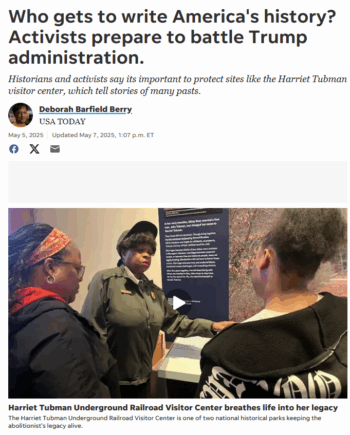
USA Today (5/5/25)
JJ: And I think that there are plenty of white people who also would say, We also want to learn the history of this country, the real history of this country. Please don’t speak in our name and say you’re protecting us from it, because it’s actually part of what white people need to learn, and want to learn as well.
I don’t know if you have any particular thoughts about reporting. Apart from USA Today‘s Deborah Barfield Berry, and a lot of folks at a local level, I haven’t seen much attention to Freedom to Learn. But part of what I’m learning is how much you can grow and maintain healthy lines of communication outside and around the news media narrative. The Banned Books Tour that you referenced went straight to schools and campuses, and set up shop and spoke directly to people. But media coverage can still help or hurt in some ways.
TCH: Yeah. We know that there has to be a groundswell in local communities as well, that it’s not going to be, as was said in a different context, “the revolution will not be broadcast.” We have to be on the ground, engaging in one-on-one contact, and that’s what we’re doing in many ways. The Freedom to Learn Week of Action this year is about getting into communities and giving people ways to engage at their local level, to obtain a digital library card that gives young people access to all of the books that have been banned.
And that is hundreds, hundreds of books that have been banned. The Autobiography of Malcolm X, learning about Ruby Bridges, To Kill a Mockingbird. These are readings that I grew up on, learning and understanding America, and it really helped to gauge, and to direct how I understood, how this could be in the society. Our children now don’t have access to that.
So we have the digital library cards that people can have there for free. We have every library. We’re partnering with them on sending letters to the editor, to your local papers, speaking to the fact that this is our history, Black history, it’s all of our history. That you’re actually engaging in revisionist history by trying to erase and not talk about what has happened in the past. Because if you do that, you’re not going to learn from it.

Tonya Clay House: “This administration is intent on repeating the sins of the past, which is why they don’t want people to learn about what happened in the past.”
And in fact, what we believe is happening is this administration is intent on repeating the sins of the past, which is why they don’t want people to learn about what happened in the past.
We have other ways in which we’re also engaging. We’re telling people to make your own video. Like you mentioned, Dr. Crenshaw uplifted the historic sites that are in your own community, that you may not know about because things are being removed. It’s not just monuments, but historic land properties, artifacts as we’ve been hearing about, things that often are on loan in different museums. If you can lift that up, take a selfie of yourself, #HandsOffOurHistory. That’s the tagline.
We’ve got a number of different ways in which we’re engaging and wanting people to uplift, but particularly on May 3, if you’re here in the DC area, we’re encouraging people to come join us, because we’re going to be gathering together on the steps of the John Wilson Building to speak to this issue of erasure, and how we’re going to reaffirm Black history. We have a Black history affirmation that we have on our Freedom to Learn website, and we have civil rights leaders from across the country and locally as well, as well as employees of the Smithsonian and others that are going to be speaking, faith leaders. We’re all coming together and we’re saying, hands off our history, and we want to show that we’re not going to allow this to happen, because this is all of our history.
And so we do want everybody to take a moment. There are ways that everybody can do just one thing, at least something. And everybody may not be able to do the marches, or not be able to do, maybe, the video. But maybe you can get the digital library card, or maybe you can give money. There are different ways in which people can engage, and we’re trying to give you all the ways to help you do that.
JJ: All right, then. We’ll end on that note of participation. We’ve been speaking with Tanya Clay House, consultant and senior strategist at the African American Policy Forum, among many other things. Tanya Clay House, thank you so much for joining us this week on CounterSpin.
TCH: Really appreciate it, thank you for having me.
Right-click here to download this episode (“Save link as…”).

$Trump marketing website.
This week on CounterSpin: They say ignorance is bliss, but I know that, for myself and others, our lack of knowledge of Bitcoin and cryptocurrency will only hurt us in our response to the effects that the dealings around that stuff are having on our lives. Bartlett Naylor breaks it down for us; he works at Public Citizen, as a financial policy advocate at their project Congress Watch.

Arctic National Wildlife Refuge (photo: Judith Slein)
Also on the show: Billionaires don’t need tax cuts; they already have a system designed to appease them. But it’s not enough! Part of the budget bill to give more to those who have everything is an effort to sell off public land for exploitation for fossil fuel companies, who are determined to die taking the last penny from our fingers. Pulling up the covers and waiting for better times isn’t the way; if we stay focused, we can save critical elements of, in this case, unspoiled wild places in this country. Ashley Nunes is public lands policy specialist at the Center for Biological Diversity. We hear from her this week about that.
Plus Janine Jackson looks back on an interview with the late Robert McChesney.
Janine Jackson interviewed CODEPINK’s Danaka Katovich about attacks on activists for the May 2, 2025, episode of CounterSpin. This is a lightly edited transcript.

CODEPINK’s Medea Benjamin
Janine Jackson: It is misleading to portray public protest simply in photos of people being dragged off the street by law enforcement, because protest and dissent take many forms, some less visible than others. Still, the people in those photos have meaning for us, about being vocal and visible in frightening times. If standing up and speaking out loud in oppressive times were easy, well, there’d be less oppressive times, wouldn’t there? Whatever one’s imaginings about what they woulda, coulda done, the reality is that it is not a walk in the park to protest in person, knowing that you may face a lethally armed officer, tasked with grabbing you and throwing you in a cell, with the weight of the state behind them.
The state also has many forms of attacks on protesters and protest, and those are not always so visible, either. All of that is in play right now, and here to talk about it is Danaka Katovich, national co-director of the group CODEPINK. She joins us now by phone. Welcome to CounterSpin, Danaka Katovich.
Danaka Katovich: Thank you so much for having me, Janine.
JJ: I know that you see what’s happening to CODEPINK as just a piece of a bigger issue, but maybe first tell us a little about what’s been happening to CODEPINK in the last few months.
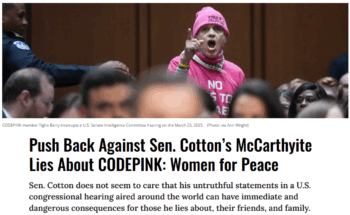
Common Dreams (3/27/25)
DK: Yeah. I think this new wave started with Sen. Tom Cotton, who’s the head of the Senate Intelligence Committee. When he was at a hearing, during a CODEPINK disruption of the hearing, he stated, like it was a fact, that CODEPINK is funded by the Chinese Communist Party. We’re not, but someone in such a high position of power saying that is difficult to navigate, scary; you wonder what they’re going to do next.
And the very next day or two days later, Sen. Jim Banks, in a different Senate hearing, repeated and regurgitated the same lies about us, and asked Pam Bondi to investigate CODEPINK for these fake and not real ties to the Chinese Communist Party.
And they’re doing that to—you know, we’re very in their face. We’re in Congress every single day, challenging them on the genocide in Gaza, and their support for the genocide in Gaza, and their constant willingness to ignore the American public. It’s their job to listen to the American public and represent us, but they don’t do that. And we’re very in their face, and they’re trying to intimidate us, and scare us into being quiet.
JJ: MAGA couldn’t hate CODEPINK any more than they do, to the extent that they know you exist. So is the hope to isolate CODEPINK, even among other pro-Palestinian groups?
DK: I don’t think so, to be honest. In my honest assessment, I think they are going after us because we’re a well-known group—online, at least—and we post everything that happens to us, and all the interactions that we have, to educate the public on what’s really going on in Congress. So I don’t think it’s to isolate us from the Palestine movement. If it is, it’s absolutely not working.

CODEPINK (4/30/25)
JJ: I sense that CODEPINK, along with other groups, understands that you have to talk around dominant media narratives. I just saw a message today talking about how simple it is to want a child born in Gaza to live. I think people can get explained away from that basic human understanding, told that politics is over your head and let smarter folks decide. But folks who don’t do organizing think maybe you just come up with a magic message, but it’s much more human to human than that, isn’t it?
DK: Oh, absolutely. And that’s what’s really rooted me in this work, is our position on this is not fringe. A poll came out last week that said 70% of Democratic voters do not support sending weapons to Israel. That is so vastly different than what that poll would’ve been two years ago, or was two years ago.
I’ve not had to read a million books—I mean, I have, but a lot of people haven’t read a million books—to have the opinion that Palestinians in Gaza, and children in Gaza, deserve every single right to dignity and life that any person on this Earth has.
Because we’re seeing their faces, we’re hearing their voices. We see what they’re going through on our phones every single day. There’s no shortage of content coming out of Gaza that Palestinians have demonstrated their humanity in the worst situations of their life. And I think people don’t have to be even politically aware to not support what’s going on in Palestine.
JJ: The expansive and transparently intimidating effort, the work that’s being applied against CODEPINK, to say you’re funded by Communist China, that’s meant to keep folks from listening to you, or thinking about what you have to say. But that intimidation could be applied to anyone that they designate they don’t want us to hear from. So it’s not like they’ve set themselves any guardrails. This is a bigger thing.
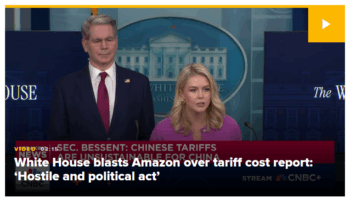
CNBC (4/29/25)
DK: Yeah. What’s funny is this morning, before we did this interview, the Trump administration was doing a press conference about Amazon. Amazon said that they were going to post the prices for how the tariffs are affecting consumers, and the Trump administration and the press secretary, I can’t remember her name, said Amazon is partnering with a Communist China propaganda arm.
JJ: Right. So it’s a go-to.
DK: It’s literally whoever they disagree with, which is probably great for us, because they’re completely making their propaganda seem so pathetic and deluded.
JJ: Right. But following from that, because it’s fascinating to me, in the way that MAGA and the right will just throw charges out there. And then when they’re disproven, they’ll say, Yeah, but they’re really still true.
It reminds me of the way prosecutors will never accept a wrongful conviction: If he didn’t do what we sent him to prison for, he did something else. So we were still right to send him to prison.

FAIR.org (8/17/23)
And I think, at a certain point, an observer has to acknowledge that truth is not the point. It’s just us versus them. And I think a lot of folks lose the plot right there, because we don’t know how to operate in a system where truth doesn’t matter. So in the face of just blatantly false charges against you, how do you keep going forward, and help other folks go forward themselves?
DK: I think one way we’ve done it is help people realize just how ridiculous it is, because they can say whatever they want, and they will continue to say whatever they want. They’re saying it as if it’s a fact. Even though, if any of this were true, they would’ve shut us down years ago, when they started bringing up these allegations. I think that is one way we approach it, is just making it as ridiculous as it is, and unserious as it is.
JJ: Finally, we need a brave independent press corps right now, that could push back on these scurrilous attacks—scratch ’em, you can see their falsehood, but they’re part of attacks on democracy and on human rights. Corporate media—spotty, good things here and there. But in the main, I don’t see it.
But of course, corporate media are not the only media. I wonder what your thoughts are, overall, on the state of journalism and protest, and just what you would like to see from reporters in this moment.
DK: When Mahmoud was arrested by ICE agents, I think there was a different sort of pushback than there were on groups that are being attacked in such ways, like these vague and false claims about supporting terrorism, or supporting Hamas, or being funded by these foreign agencies or whatever. I think there was some pushback from even mainstream media. They were asking critical-thinking questions that I feel like they’ve been completely not doing for years and years.
But when it’s a group, when it’s CODEPINK or all these other Palestine organizations, they don’t ask these critical-thinking questions that they’ve asked when it happens to individuals. So, when someone accuses a feminist organization in the US of being funded by a foreign government, I would like to hear them challenge that, because it’s a direct attack on civil society. We are a registered 501(c)(3) nonprofit, and they’re trying to take us down a peg, and even mainstream media who claim to support women’s rights and all of these things don’t even question it at all. So I’d love to hear them actually be critical of the Trump administration in a way that’s not just benefiting their specific neoliberal values.

Danaka Katovich: “Their goal here is to make people afraid of expressing a very normal human opinion.”
JJ: And then, any final thoughts for activists who might be kind of afraid to go out in the street or to join an organization, because they feel targeted and fearful? What do you have to say to folks?
DK: I would say the fear is the point of all of this. I fluctuated between being scared that they want to shut down CODEPINK… The thing that I come back to is, their goal here is to make people afraid of expressing a very normal human opinion. The point is fear. And I think if they’ve instilled fear, then they’re winning. And I think it’s OK to be afraid. I think it’s normal and human. But in this trajectory that we’re on, it will only get scarier to resist what is happening.
JJ: And we’ll do it in community, yeah?
DK: Absolutely.
JJ: We’ve been speaking with Danaka Katovich. She’s national co-director at the group CODEPINK. Thank you so much, Danaka Katovich, for joining us this week on CounterSpin.
DK: Thank you so much for having me on.